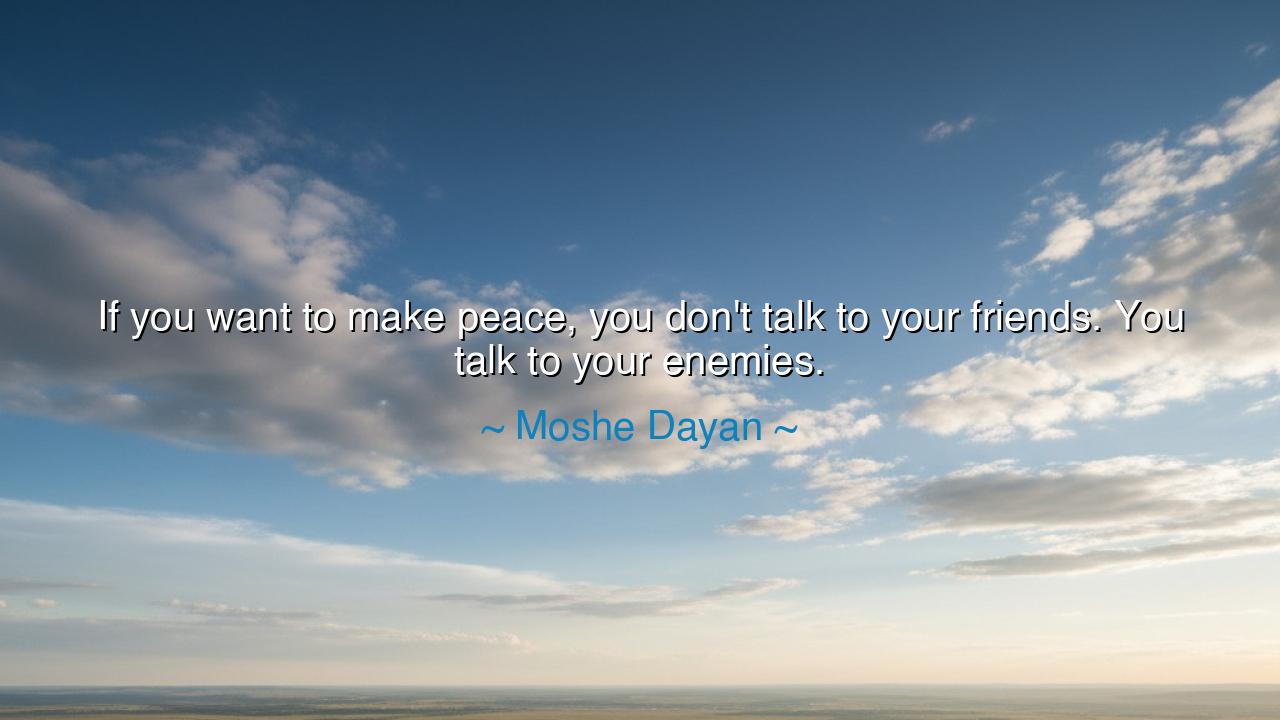
If you want to make peace, you don't talk to your friends. You






The ancient words of Moshe Dayan—“If you want to make peace, you don’t talk to your friends. You talk to your enemies.”—carry the weight of centuries of human struggle. They are not words of comfort, but of challenge, for they strike at the heart of our pride. Friends do not need reconciliation; their hearts already rest near ours. It is the enemy, the one whose hand has shed our tears and whose shadow brings us fear, that must be faced if peace is to be born. To speak with an enemy is to walk into the fire willingly, not with hatred, but with courage and vision.
Consider how many ages have been scarred by war because men could not humble themselves to speak across the abyss. A thousand oaths sworn among allies may bring strength in battle, but none of them can still the thunder of war. Only when the voice rises across the line of enmity can the storm begin to break. Thus Dayan’s words remind us: peace is not the fruit of harmony with those who love us—it is the harvest of daring dialogue with those who despise us.
History itself gives us testimony. Recall the day when Nelson Mandela, after twenty-seven years in prison, walked free and extended his hand to his jailers. He did not seek the embrace of his allies only, but sat at the table with those who had chained him. South Africa, broken and bleeding, did not find peace in the chanting of friends alone, but in Mandela’s boldness to look into the eyes of his enemies and say, “Let us build a nation together.” This was not weakness, but the highest form of strength. His act was a living echo of Dayan’s wisdom.
The ancients knew this truth well. When rival kings at last laid down their swords, it was not because they loved one another, but because they had the vision to see beyond the battlefield. The Romans, mighty and cruel, built their empire not merely by conquest, but by binding former foes into their ranks. Where enemies were invited to share in the spoils of order, there the empire endured. Where enemies were crushed without voice, there rebellion festered. Even empires, those towers of might, learned that talking to one’s enemies was the secret to lasting dominion.
The emotional weight of Dayan’s words calls us to bravery of a different kind. To confront an enemy in war is easy, for anger blinds the heart. But to face an enemy in peace requires humility, patience, and the willingness to risk rejection. This is the greater heroism—not slaying, but healing; not conquering, but reconciling. The path of peace is carved by those who dare to set aside vengeance for the higher prize of a future unbroken by endless retaliation.
Let the lesson be plain: in our lives, small though they may seem compared to the wars of nations, the wisdom is the same. If you have quarreled with a brother, if bitterness has grown between you and a neighbor, if silence lies heavy where friendship once bloomed—then the path forward is not in clinging to those who already love you. It is in crossing the threshold of fear, speaking to the one you have avoided, and daring to rebuild. Talk to your enemy, and in so doing, you may turn them into something greater than a friend: a partner in peace.
Practical wisdom follows. When next conflict arises in your own life, resist the urge to withdraw into your circle of allies. Instead, seek out the one who has wronged you—or whom you have wronged. Approach them with openness, not arrogance. Listen more than you speak. Offer the olive branch not once but many times, for peace is not made in a moment, but in the slow weaving of trust. The world is transformed not by endless enmity, but by those few who dare to turn enemies into allies.
Thus let Dayan’s words be engraved upon the heart: peace is forged where enmity once ruled. To talk only with friends is to live in safety but stagnation. To speak with enemies is to step into danger, yes, but also to open the gates to a future where swords can finally be beaten into ploughshares. This is the way of the wise, the brave, and the builders of tomorrow.






AAdministratorAdministrator
Welcome, honored guests. Please leave a comment, we will respond soon